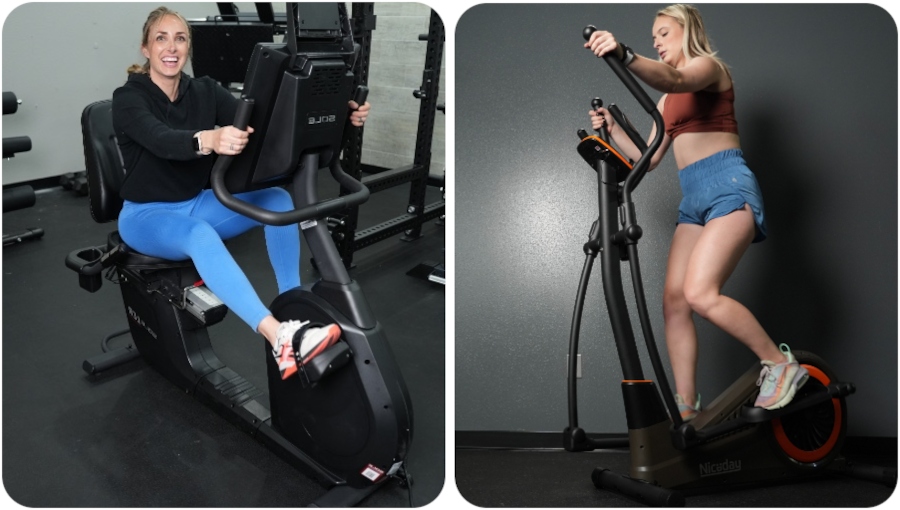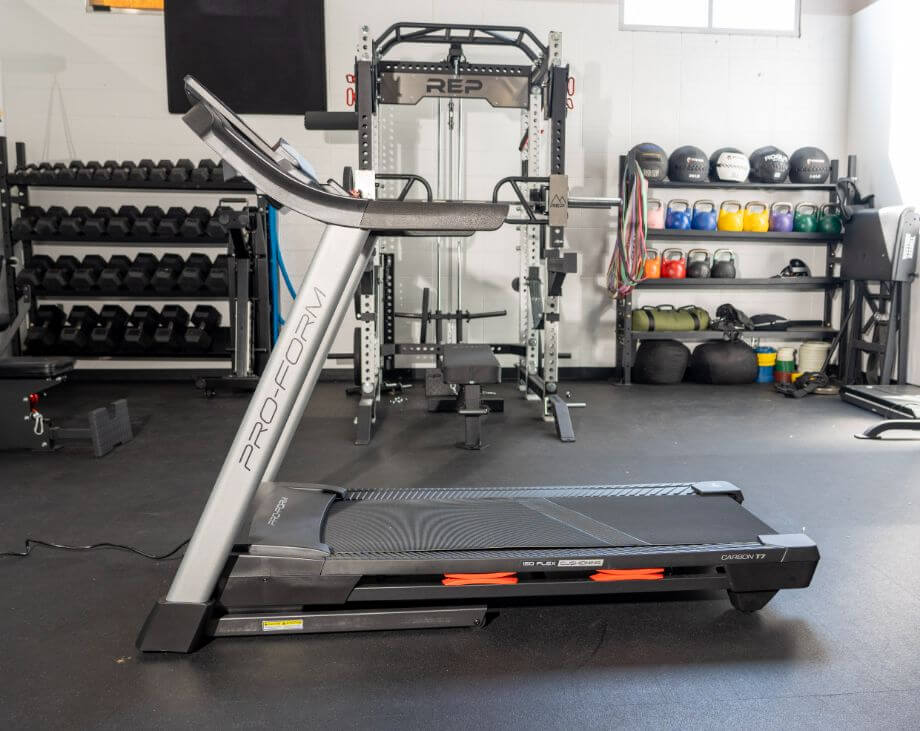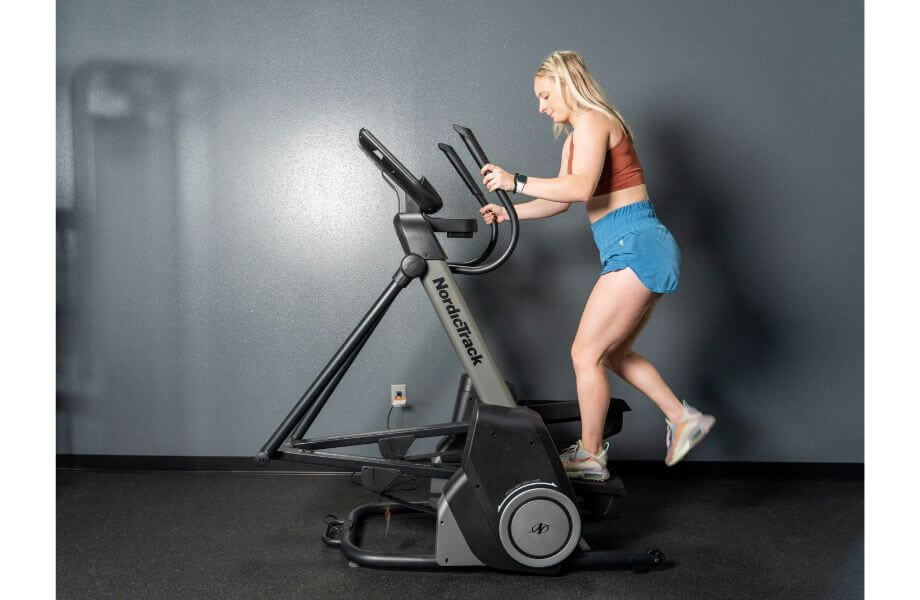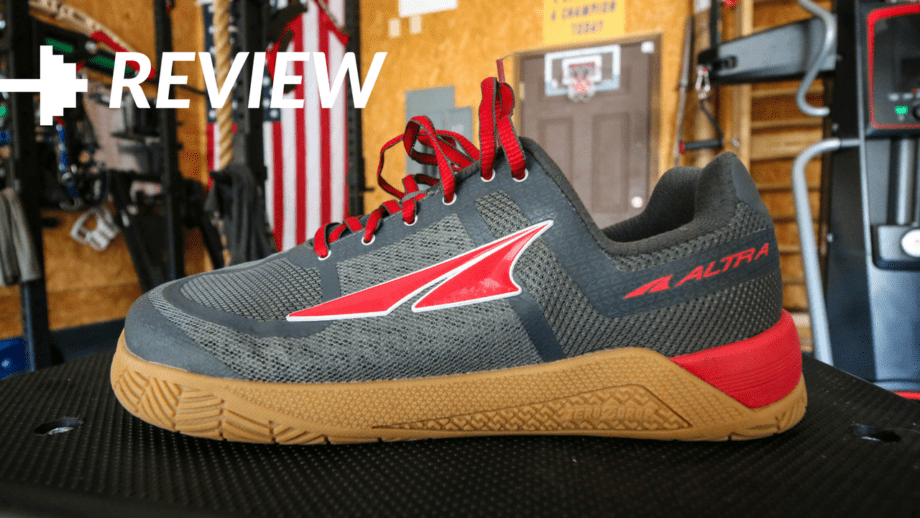Regular cardiovascular exercise is an important part of many people’s fitness routines and provides all sorts of health benefits. There are many ways to elevate your heart rate and improve your cardiovascular fitness. One popular option is to use a low-impact machine, like a cross trainer, elliptical, stationary exercise bike, or rower.
For those who regularly perform high-intensity strength training, like weightlifting, CrossFit, powerlifting, or bodybuilding, the wear and tear from running or sprinting can provide too much impact, interfering with recovery between lower body workouts.
That’s where low-impact cardio machines save the day, as they allow users to get in a great cardio workout without putting too much additional strain on the joints. People who train at a commercial gym likely have access to all sorts of fitness equipment, but for home and garage gym owners, space is at a premium, and you may only be able to add one machine.
If you train in a commercial gym, you can use whichever you prefer, but the decision is a little more challenging when investing in a garage gym. In this cross trainer vs exercise bike guide, I’ll explain the benefits and key differences of each and help you decide which is the better choice if you’re looking to upgrade your home gym.
What Are Cross Trainers?
A cross trainer is a type of elliptical machine where both your hands and feet can move at the same time. While it may seem like all ellipticals are the same, some have fixed handles so that your arms can’t move, and only the ones with moving arms are considered cross trainers.
With a cross trainer, the movement is similar to running, as you’re in an upright position with all of your limbs moving together. However, there’s no jarring impact from your foot striking the ground with each step.
RELATED: Elliptical Workouts for Runners
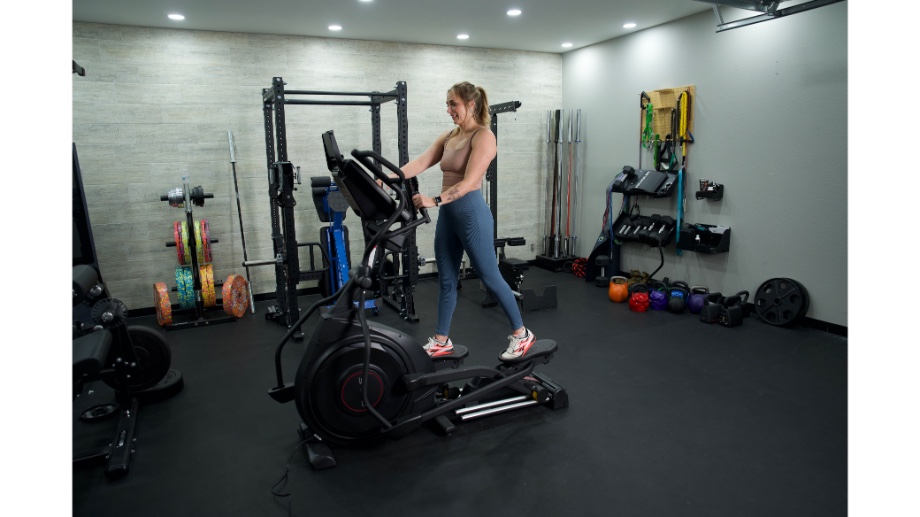
Cross trainers generally have adjustable resistance, and many allow you to adjust the incline or stride length to customize your workout.
Note: Many sources, including the research papers linked in this article, use the words elliptical and cross trainer interchangeably, as cross-training can also refer to performing multiple types of exercise on a regular basis. If a study references an elliptical, the benefits will be the same on a cross trainer.
Benefits of Using a Cross Trainer
Given that a cross trainer is meant to replicate the experience of walking, incline walking, or running, you may be wondering why you’d need one in the first place when you can simply walk outside. Here are a few of the most important benefits to consider.
Variable Incline and Stride Length
Cross trainers allow you to adjust the resistance level, and most allow you to adjust either the incline, stride length, or both. If you prefer shorter strides with more resistance or longer strides with less resistance, you can get the settings to match your preferences.
For example, many find that increasing the incline helps them engage the glutes and hamstrings more, so you can play with the settings to find an incline that feels best.
With outdoor running, you can’t change the incline whenever you feel like it—you simply have to follow whatever road, track, or trail you’re using. Cross trainers provide more customization.
Full-Body Workout
Cross trainers provide a more full-body workout than other cardio equipment like the best treadmills, stationary bikes, or stair climbing machines, which tend to focus on the lower body. Your arms are engaged and need to move along with your body rather than resting by your side.

This may be why data shows that using a cross trainer increases your heart rate1 more than a treadmill, and the resulting energy expenditure is similar between the two, despite ellipticals being a lower-impact form of cardio.
Low-Impact Alternative to Running
When I was working as a full-time personal trainer, many of my clients thought the cross trainer was too easy… until they tried it. Even a low-impact form of cardio like a cross trainer can be quite challenging and provide an intense workout if used correctly.
RELATED: Elliptical Workouts for Runners
This 2021 study2 compared the physiological and metabolic responses of an elliptical, stepper, and treadmill, and found no significant differences when the overall intensity was the same. It concluded that ellipticals are a good substitute for running when high-impact training needs to allow your leg muscles to recover.
What Are Exercise Bikes?
Exercise bikes are indoor stationary bicycles available in several varieties. They allow you to pedal your way to better health and enjoy indoor cycling from the comfort of your own home.
Air bikes use a large fan where the front tire would be and normally have moving arms that also attach to the fan, and the resistance increases as you go faster. These are generally great choices for interval training, as the resistance automatically increases as you exert more effort.
RELATED: Air Bike Vs Stationary Bike

Spin bikes are generally smaller and lighter, using a flywheel for resistance, and some kind of knob you turn to add or change resistance. Compared to air bikes, spin bikes also allow you to quickly add or remove resistance, but the arms are stationary, and it’s easier to maintain a steady resistance.
Finally, we have different forms of upright bikes and recumbent bikes. These bikes may have things like a backrest or padded seat, and resistance is adjusted using the control panel. These are the sort of exercise bikes you commonly see in commercial gyms.
Benefits of Using an Exercise Bike
If you’re considering adding an exercise bike to your home gym but haven’t quite made up your mind, here are some of the most important benefits.
Improved Cardiovascular Health
The American Heart Association3 recommends at least 150 minutes per week of moderate aerobic exercise, and an exercise bike is a convenient way to get this done from the comfort of your home.
Using an exercise bike is a fantastic way to get your cardio exercise, regardless of your fitness level. It allows you to raise your heart rate and sustain it for periods of time, or easily perform HIIT workouts if you’d like.
RELATED: The Best Cardiovascular Exercise to Improve Your Fitness
Variable Resistance
Using an exercise bike makes it much easier to control your resistance level compared to biking on the road. Whether you’re performing steady-state cardio or a HIIT bike workout, exercise bikes make changing your resistance quick and easy.
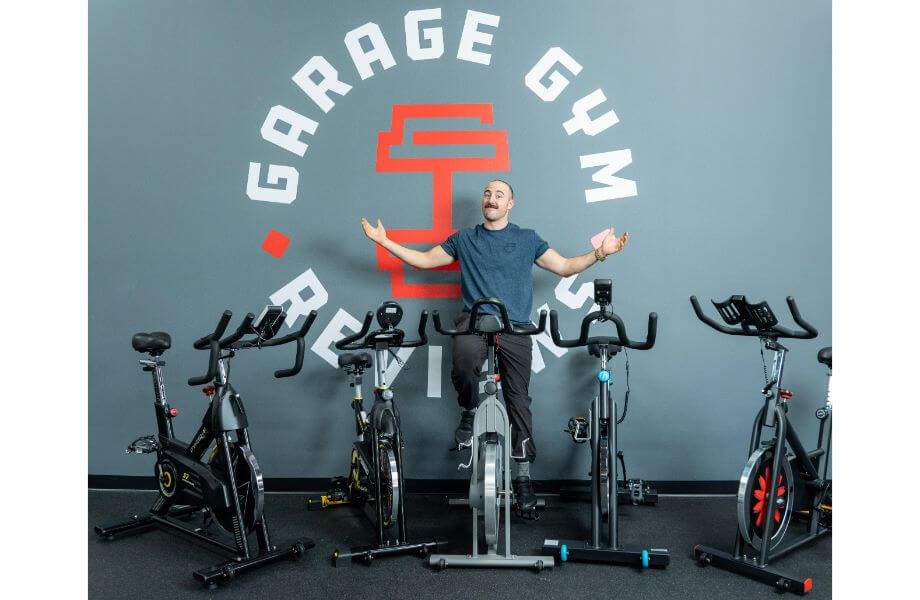
You don’t have to worry about unexpected inclines or declines. You can simply pedal faster on an air bike or adjust the resistance on a standard exercise bike as you see fit.
Adjustability
Some cardio machines, like treadmills, cross trainers, or stair steppers offer very little in the way of adjustability. You may be able to change the resistance or incline, or in some cases, the stride length, but that’s about it.
Most exercise bikes allow you to customize the seat height, the handlebar height, and the horizontal distance between the seat and handles. If you’re using your own bike at home, you can swap out the seat cushion and pedals if you want.
Unlike other cardio machines, bikes can be customized to match your body’s unique shape, which is why many cyclists choose to have their bikes custom-fitted to optimize their training.
Cross Trainer vs Exercise Bike: Comparison Table
To help clearly illustrate the difference, let’s compare the two side by side. We’ve created detailed guides covering the best exercise bikes and the best ellipticals, so I’ll compare the “best overall” picks from both guides.
Both are from NordicTrack, so we’ll compare the NordicTrack AirGlide 14i elliptical and the NordicTrack S22i exercise bike.
| NordicTrack AirGlide 14i Elliptical | NordicTrack S22i Bike | |
| Dimensions | 69″ L x 25″ W x 71″ H | 61” L x 22” W x 58” H |
| Weight | 244 lbs in box | 193.6 lbs |
| Weight Capacity | 300 lbs | 350 lbs |
| Resistance Levels | Auto-adjusting silent magnetic resistance | 24 digital resistance levels |
| Incline | -5% decline to 15% incline | -10% decline to 20% incline |
As you can see, the elliptical has a heavier product weight, larger dimensions, and a larger footprint, though it allows for both incline and decline settings.
The bike is smaller and lighter, with a higher weight capacity and a larger range of incline settings.
Differences Between Cross Trainers and Exercise Bikes
Since both cross trainers and exercise bikes offer a low-impact exercise option, let’s explore some key differences to help you decide which is a better fit for your home gym.
Muscles Targeted
When using an exercise bike, you’re generally focusing on your lower body unless you’re using an air bike that also engages the arms. This is a good way to improve your cardiovascular health and get your legs some training. Unless you’re standing up while riding, you don’t need to worry about your core muscles or any other stabilizer muscles.
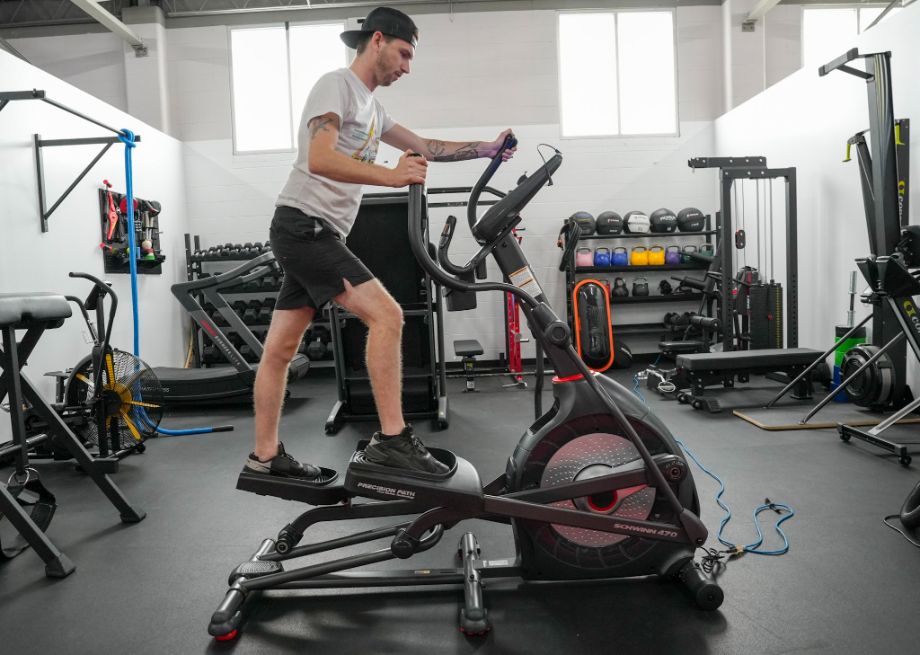
On the other hand, all cross trainers are full-body workouts since you’re using your hands and legs together. There’s usually a bit of balance involved to make sure you don’t fly off the pedals. Cross trainers may also have adjustable stride lengths and inclines, allowing you to shift the focus to different muscles in your legs.
Floor Space
The dimensions vary depending on the product, but in general, cross trainers tend to have a larger footprint than exercise bikes. There are always exceptions, but most cross trainers will be longer, taller, and heavier than exercise bikes. Before purchasing either one, you’ll want to make sure you have plenty of space to set it up.
RELATED: The Best Compact Exercise Equipment for Small Spaces
Portability
While many users won’t be moving their equipment around on a daily basis, there are plenty of times when you may need to move a machine, whether you’re doing a deep clean or re-arranging your gym.
Again, things can vary from product to product, but most bikes are significantly lighter and easier to move compared to cross trainers.
Adjustability
You’ll also want to consider how many settings you want to customize. A cross trainer allows you to change the resistance, stride length, and incline, but not much else. If you don’t love how it lines up with your unique structure, there’s not much you can do about it.
On the other hand, an exercise bike will allow you to change nearly every setting, perfectly tailoring to your needs and preferences.
How to Choose Between a Cross Trainer and Exercise Bike
If you’re having a hard time deciding between the two, here are three of the most important factors to consider when choosing any new gym equipment, especially one that can take up so much space.
Budget
This may seem obvious, but consider how much money you’re willing to spend. If you’re looking for a smart machine with display screens, streaming classes, and more, you’ll also want to factor in any subscriptions or membership fees.
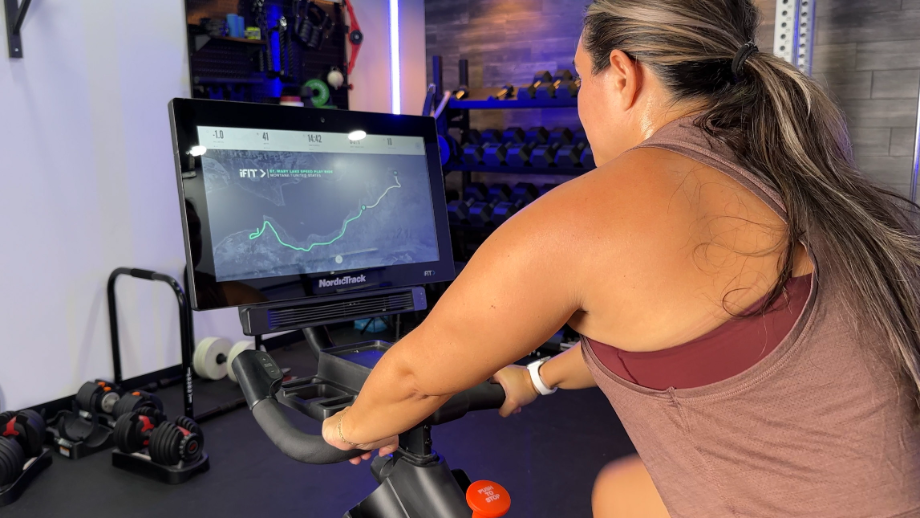
With so many options available for both cross trainers and exercise bikes, it’s impossible to say which one is going to be the more affordable option. That said, exercise bikes are usually, but not always, cheaper. Our pick for the best budget elliptical is $699 at the time of writing, while our best budget exercise bike is only $399.
Gym Size
How much space are you working with? If you’ve got plenty of room, you could choose either option or both. If space is tight, you’ll probably want to go with the smaller option, which will generally be the exercise bike.
Personal Preference
Finally, your personal preference plays a big role here. Both options provide a great low-impact workout, but if space and money are no issue, you should choose the one you enjoy more.
Many people will naturally prefer one over the other, and if floor space and money are no issue, go for the one you enjoy the most. You truly can’t go wrong with either option, assuming you choose a high-quality product.
Cross Trainer vs Exercise Bike: Final Thoughts
Cross trainers and exercise bikes offer a low-impact way to elevate your heart rate, helping you improve your cardiovascular fitness as you work on your fitness goals.
In general, ellipticals are slightly larger and may cost more, but they’ll provide a full-body workout that engages more muscle groups. Exercise bikes are often smaller and more affordable, though unless you’re getting an air bike, they’ll primarily work your lower body, emphasizing the quads in particular.
Ultimately, both are great options to add to your home gym, and your decision should be dictated by floor space, budget, and personal preference.
Cross Trainer vs Exercise Bike: FAQs
Is a cross trainer or exercise bike better?
Both are very beneficial pieces of equipment for cardiovascular training. Cross trainers keep you in an upright, standing position and engage your lower and upper body, while exercise bikes are seated, keeping the focus on your legs.
Since both are very low-impact and stable when used correctly, both are good for beginners and advanced exercisers alike.
Is the cross trainer or exercise bike better for weight loss?
Both exercise machines can help you burn calories if you’re focusing on weight loss, so you can use whichever you prefer. This study4 found that cross trainers burn slightly more calories than an exercise bike, though the difference was small, and both were very effective for increasing energy expenditure.
Is an elliptical or bike better for legs?
Ellipticals tend to provide more of a challenge as you’re supporting your own body weight and moving against resistance, but both options can provide a great workout for your legs with the proper resistance.
References
- Brown, G. A., Cook, C. M., Krueger, R. D., & Heelan, K. A. (2010). Comparison of energy expenditure on a treadmill vs. an elliptical device at a self-selected exercise intensity. Journal of strength and conditioning research, 24(6), 1643–1649. https://doi.org/10.1519/JSC.0b013e3181cb2854
- Bosch, A. N., Flanagan, K. C., Eken, M. M., Withers, A., Burger, J., & Lamberts, R. P. (2021). Physiological and Metabolic Responses to Exercise on Treadmill, Elliptical Trainer, and Stepper: Practical Implications for Training. International journal of sport nutrition and exercise metabolism, 31(2), 135–142. https://doi.org/10.1123/ijsnem.2020-0155
- How much physical activity do you need? (n.d.). www.heart.org. https://www.heart.org/en/healthy-living/fitness/fitness-basics/aha-recs-for-physical-activity-infographic#:~:text=Get%20at%20least%20150%20minutes,preferably%20spread%20throughout%20the%20week.
- Prieto-González, P., & Yagin, F. H. (2024). Energy expenditure, oxygen consumption, and heart rate while exercising on seven different indoor cardio machines at maximum and self-selected submaximal intensity. Frontiers in sports and active living, 6, 1313886. https://doi.org/10.3389/fspor.2024.1313886


